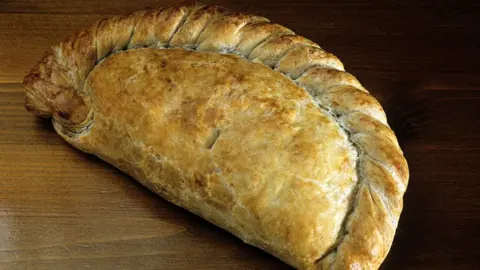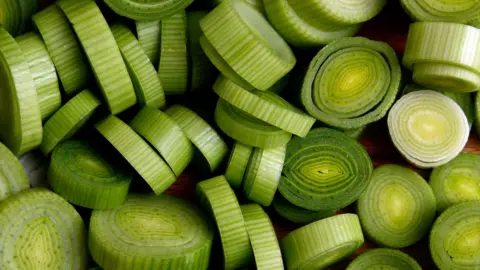PGI status: Could Welsh leeks become the new Cornish pasty?
The Cornish pasty, Gower salt marsh lamb, Anglesey sea salt and now... Welsh leeks?
Leeks grown in Wales could be given Protected Geographical Indication (PGI) status and international recognition if an application is successful.
The vegetable has been synonymous with Wales and formed part of its culture going back at least 1,000 years, according to food historian Carwyn Graves.
Mr Graves said the ability to grow leeks in Wales' milder climate all year round had historically helped prevent malnutrition.
Farmer John Addams-Williams said the national vegetable and emblem was unique and needed "to be protected".
What is PGI status?
 Getty Images
Getty ImagesIn the UK, PGI status is awarded by the UK government to protect and promote named regional food products that have a reputation or noted characteristics specific to that area.
There are worldwide schemes to obtain PGI status, which must comply with strict World Trade Organization rules.
There are currently 18 Welsh items on the UK Geographical Indication (GI) list, which includes the prestigious PGI designation.
If accepted, it will mean only Welsh leeks will be able to be sold with the UK PGI logo, guaranteeing the leeks were grown in Wales.
Grown slow, taste strong
 PUFFINPRODUCE
PUFFINPRODUCE
Mr Addams-Williams, who works at Puffin Produce in Haverfordwest, Pembrokeshire, which applied for the new status, said it would represent "a huge opportunity" for the agricultural sector in Wales.
"Our leeks are different to those sold elsewhere - we need to support Welsh industry," he said.
Many leeks sold in Wales are grown elsewhere, but Mr Addams-Williams said Welsh leeks were grown slower, have a stronger flavour and a "vibrant flag" used in national dishes such as Welsh cawl.
"The more things we have for our national identity - whether that be a daffodil or a leek - is very important and we need to protect the status. It is all part of our culture and history and the more we do the better it can be."
Why are leeks so important in Wales?
 Carwyn Graves
Carwyn GravesFood historian Carwyn Graves said: "Leeks go back a lot longer than people would expect.
"Many countries have got plants symbolising them and some of those date back a few hundred years, but the Welsh leek may date back to the very first origins of Welsh nationhood."
He said there were tales of leeks being used by Welsh soldiers as a distinguishing marker during the Saxon era (410-1066AD), and of battles in leek fields.
While there is not enough evidence to prove these narratives beyond doubt, Mr Graves said "people were referring to leeks by the early Middle Ages as a kind of marker of the Welsh, so the mythology has been around for at least 1,000 years".
He said leeks had also been used to symbolise Welsh people in the arts.
Shakespeare's Henry V, written in about 1599, speaks of Welsh men wearing leeks in their caps, while an anonymous ballad from a similar time speaks of the vegetable being worn on St David's Day.
Unlike other nations' symbols, such as tulips in the Netherlands, Mr Graves said the leek was actually useful to Welsh communities.
He said they were "probably one of the main things that kept the Welsh from scurvy" as they grew all year round in Wales' milder climate.
"The leek is a great vegetable, really versatile and tasty, and one of the shortcomings we have in Wales is we don't grow enough veg and fruit here," he added.
"If more leeks were grown here it would only be a good thing."
 Getty Images
Getty ImagesGlyn Roberts, who is president of the Farmers Union of Wales, said PGI status would further increase awareness of Welsh produce.
"PGI status is more important now than it has been because we are in a global market and the food we produce in Wales is second to none," he added.

- PEOPLE THOUGHT OF AS BITS OF AN ALGORITHM: Life and death in the warehouse
- LOVE LETTER TO WRESTLING: The best there is, the best there was, the best there ever will be

